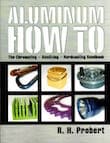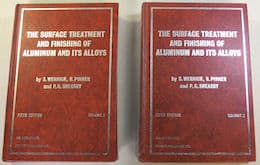
Curated with aloha by
Ted Mooney, P.E. RET

The authoritative public forum
for Metal Finishing 1989-2025

-----
Effect of hard anodization on aluminum substrate
I'm looking to hard anodize a relatively intricate aluminum part for wear purposes. My question relates to types of aluminum; Will the Anodizing treatment change the bulk material properties of the underlying material? or if subjected to a large(ish) load will the elastic deformation of the part crack the anodizing coat. In short can I use 6061 or should I use something stronger like 7075 or 2024? which I understand is more difficult to hard anodize not to mention more expensive. Also will the thickness of the coat affect this by increasing the transition area?
Derek White- Vancouver, BC, Canada
2002
2002

Aluminum How-To
"Chromating - Anodizing - Hardcoating"
by Robert Probert
Also available in Spanish
You'll love this book. Finishing.com has sold almost a thousand copies without a single return request :-)
Treatment &
Finishing of
Aluminium and
Its Alloys"
by Wernick, Pinner
& Sheasby

(note: this book is two volumes)
on eBay or
AbeBooks
or Amazon
(affil links)
The hard anodize coating is aluminum oxide, and is very brittle. It will crack under large deformation. It does not change the bulk properties of the aluminum, but it does reduce the fatigue life of the part. The coating on 6061 is harder than on 7075 or 2024 (abrasion test requirements on the different materials allow for less wear on 6061).
Guy Lester- Ontario, California
As Guy says hard anodizing layers are very very brittle, in fact is common to find that the layer has already cracked before any tension or work is applied to the part, although in my experience it won't affect corrosion or wearing characteristics, you can also use a Teflon seal to improve the performance of the part.
Alloy 6063 will also work fine and is relatively easy to machine.
- Mexico City, Mexico
2002
Q, A, or Comment on THIS thread -or- Start a NEW Thread